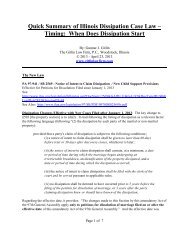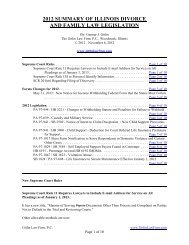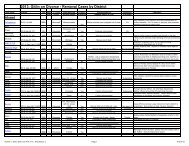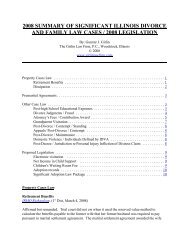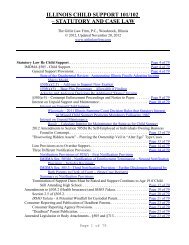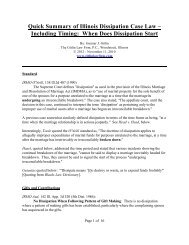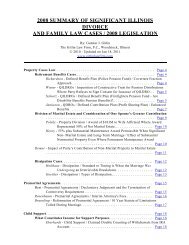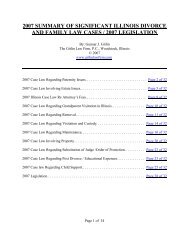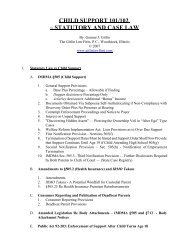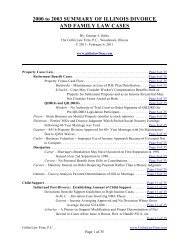Illinois Attorney's Fees and the Leveling the Playing Field Act
Illinois Attorney's Fees and the Leveling the Playing Field Act
Illinois Attorney's Fees and the Leveling the Playing Field Act
You also want an ePaper? Increase the reach of your titles
YUMPU automatically turns print PDFs into web optimized ePapers that Google loves.
Rudolf argues <strong>the</strong> award of fees under section 508(a) was improper because <strong>the</strong><br />
petitioning party must prove an inability to pay fees <strong>and</strong> <strong>the</strong> ability of <strong>the</strong> o<strong>the</strong>r<br />
party to pay. Here, <strong>the</strong> court found each party had <strong>the</strong> ability to pay his or her own<br />
fees. Rudolf contends "inability to pay" is a prerequisite to a fee award under<br />
section 508(a). Such a reading of this section eviscerates <strong>the</strong> statutory directive in<br />
section 503(j)(2) to consider <strong>the</strong> criteria for <strong>the</strong> division of marital property under<br />
section 503(d) in making contribution awards. Under Rudolf's reading of section<br />
508(a), once a court finds a party has <strong>the</strong> ability to pay his or her own fees, fur<strong>the</strong>r<br />
inquiry ends <strong>and</strong> <strong>the</strong> court need not look at any o<strong>the</strong>r factor to determine whe<strong>the</strong>r<br />
contribution should be made. Rudolf is wrong. ***<br />
The statute directs <strong>the</strong> court to consider many factors when deciding <strong>the</strong> amount of<br />
contribution a party may be ordered to make. The requirement that a person seeking<br />
contribution show an inability to pay appears nowhere in <strong>the</strong> statute. The relative<br />
financial st<strong>and</strong>ing of <strong>the</strong> parties should be considered, <strong>and</strong> that is what <strong>the</strong> section<br />
503(d) factors are all about.<br />
Brackett — Trial Court Must Conduct Hearing on Previously Filed Contribution<br />
Petition: Ano<strong>the</strong>r significant case addressing <strong>the</strong> <strong>Leveling</strong> Amendments was <strong>the</strong> Brackett case in<br />
which I was <strong>the</strong> appellate lawyer for Mrs. Brackett. Brackett held that following <strong>the</strong> filing of a<br />
petition for contribution for fees, <strong>the</strong> trial court must conduct a hearing on <strong>the</strong> petition. IRMO<br />
Brackett, 309 Ill.App.3d 329, 242 Ill.Dec. 798, 722 N.E.2d 287 (2d Dist. 1999). One question in<br />
Brackett was whe<strong>the</strong>r a separate hearing is necessary for a contribution petition. Brackett held:<br />
We, however, temper our agreement with McGuire by cautioning against too<br />
literal a reading of section 503(j). We do not read section 503(j) as requiring an<br />
additional hearing, which would fur<strong>the</strong>r burden already overburdened trial courts,<br />
but, ra<strong>the</strong>r, as requiring a trial court to hear, through testimony or o<strong>the</strong>rwise,<br />
additional proofs when a petition for contribution is filed in accordance with<br />
section 503(j) in <strong>the</strong> context of preexisting proceedings. If <strong>the</strong> trial court wishes to<br />
hold a separate <strong>and</strong> distinct hearing on <strong>the</strong> petition, it has <strong>the</strong> discretion to do so.<br />
Selinger -- Appellate Court Affirmed Denial of Separate Fee Hearing Where Not<br />
Sought on Timely Basis: A relatively recent case addressing whe<strong>the</strong>r a separate hearing is<br />
required in a contribution hearing is <strong>the</strong> Fourth District 2004 Selinger decision. In Selinger, <strong>the</strong><br />
appellate court affirmed <strong>the</strong> trial court's denial of any right to contribution. The wife in Selinger<br />
earned approximately $36,870 per year from her job as a registered nurse while <strong>the</strong> husb<strong>and</strong><br />
earned more than $100,000 from his various jobs. Regarding <strong>the</strong> issue of whe<strong>the</strong>r a separate fee<br />
hearing must be conducted, <strong>the</strong> appellate court stated:<br />
The lack of a hearing here is not dispositive. The assets <strong>and</strong> liabilities of <strong>the</strong> two<br />
parties were already before <strong>the</strong> court, as was <strong>the</strong> amount of Pamela's attorney fees.<br />
We fail to see what o<strong>the</strong>r evidence had to be presented for <strong>the</strong> court to rule on<br />
Gunnar J. Gitlin Gitlin Law Firm, P.C. www.gitlinlawfirm.com




